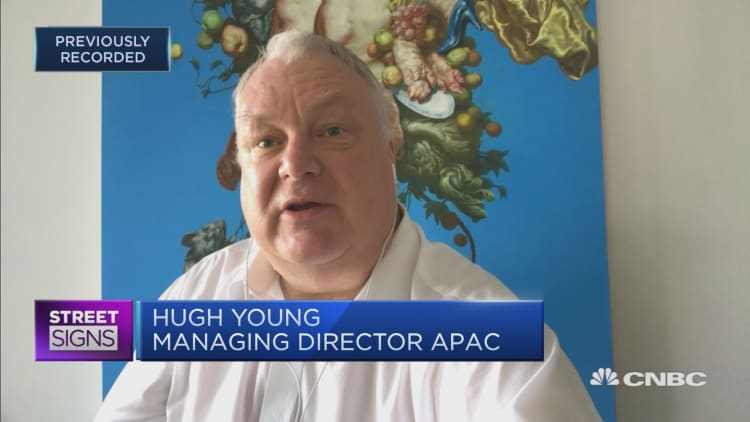
Stocks in Asia declined on Friday after an overnight report that raised doubts over a potential coronavirus treatment.
Mainland Chinese stocks dropped by their close, with the Shanghai composite 1.06% lower at about 2,808.53 while the Shenzhen composite shed 1.48% to around 1,736.93. The Shenzhen component also fell 1.33% to 10,423.46. Hong Kong's Hang Seng index was about 0.4% lower, as of its final hour of trading.
Over in South Korea, the Kospi fell 1.34% to close at 1,889.01 while the Kosdaq index finished its trading day 1.68% lower at 632.96.
The Nikkei 225 in Japan shed 0.86% to close at 19,262 while the Topix index declined 0.33% to end its trading day at 1,421.29.
Elsewhere, Australia's S&P/ASX 200 closed 0.49% higher at 5,242.60.
Overall, the MSCI Asia ex-Japan index dipped 0.63%.
The moves regionally came following an overnight report by the Financial Times — citing documents accidentally published by the World Health Organization — saying that Gilead Sciences' drug remdesivir did not improve coronavirus patients' condition. The documents cited by the FT referred to a Chinese clinical trial.
Gilead noted that study was "terminated early due to low enrollment," leaving it "underpowered to enable statistically meaningful conclusions. As such, the study results are inconclusive."
That development comes as the coronavirus continues to spread globally, with more than 2.7 million people infected worldwide and at least 190,303 lives lost, according to data compiled by John Hopkins University.
"COVID-19 continues to (rightly) be the front of mind for investors," Hannah Anderson, global market strategist at JPMorgan Asset Management, wrote in a note. She warned that investors should not "conflate" medical and economic data, as progress in combating the virus is "not the same as returning the economy to the place it was last fall."
"Investors need to understand that the risks associated lifting public health measures too early could further exacerbate market pain," Anderson said. "On balance, investors should expect more volatility across all asset classes as we try to appropriately price in something we have never experienced before."
Hugh Young, managing director for the Asia Pacific region at Aberdeen Standard Investments, warned that markets "have not accurately priced in the risks."
"Markets have obviously recovered substantially from the lows and then I suspect it will just gently seep in ... or maybe not so gently seep in that the economic consequences are actually huge of what's going on," Young told CNBC's "Street Signs" on Friday.
Meanwhile, oil prices continued their comeback from a recent slump. In the afternoon of Asian trading hours, international benchmark Brent crude futures gained 2.39% to $21.84 per barrel. U.S. crude futures also jumped 2% to $16.83 per barrel.
The U.S. dollar index, which tracks the greenback against a basket of its peers, was last at 100.754 after an earlier high of 100.795.
The Japanese yen traded at 107.70 per dollar after seeing an earlier high of 107.53. The Australian dollar changed hands at $0.6349 after touching an earlier high of $0.6381.
— CNBC's Fred Imbert contributed to this report.


